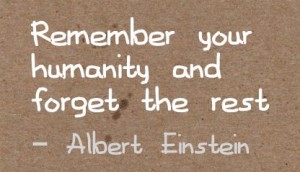Injecting Humanity into the Claims Process - share with claims, legal, and insurers
 In the disclosure movement, we spend a lot of time teaching docs and nurses how to say "sorry" after something goes wrong, and how to get c-suite, risk, and legal to be pro-active post-event and meet the emotional and financial needs of patients, residents, families, and clinicians. There is a lot to think about and do. Lots of logistics. Ultimately, however, what we are trying to do is inject humanity into the claims process.
Inject humanity into the claims process?
In the disclosure movement, we spend a lot of time teaching docs and nurses how to say "sorry" after something goes wrong, and how to get c-suite, risk, and legal to be pro-active post-event and meet the emotional and financial needs of patients, residents, families, and clinicians. There is a lot to think about and do. Lots of logistics. Ultimately, however, what we are trying to do is inject humanity into the claims process.
Inject humanity into the claims process?
Yes...because for so long humanity along with emotions, feelings, etc have literally been stripped out of the med-mal claims process. Humanity and the emotional needs of consumers and clinicians have been pushed out of the way by an overriding concern with money. Both sides (defense and plaintiffs) stress over the bucks. For claims and defense, the fixation on money is why clinicians have historically been silenced post-event, and relationships with patients and families terminated. Hospitals and insurers have always tried to portray a tough image. Some plaintiff's attorneys have confided that many zeros on a check can be a hollow victory for a family when the doctor/hospital refuses to apologize, provide details of the errors, and discuss how mistakes will be prevented in the future. Moreover, the 2nd victim movement is now a hot topic as clinicians are sharing stories of PTSD, ruined careers, divorce, and even suicide because emotional support (not legal support!) is lacking post-event. Humanity is in short supply.
Look, we can finger point all day about who pushed humanity out the door by fixating on money, and get nowhere. At Sorry Works! we've always believed that the fix to med-mal begins (and mostly ends) with the medical community and the risk, claims, and legal professionals who support clinicians post-event. These folks are - for lack of a better term - organized in units we call hospitals, medical practices, or insurers. Dealing with plaintiff's attorneys and consumers is literally like trying to herd cats. So, working with hospitals and insurers is the key, yet there are still too many claims professionals and defense lawyers who have the "old-style" insurance mentality. Victory for these folks is how many dollars (or pennies) they can save the company. By fighting over money, they ignore humanity or just strip it out of the claims process altogether. In other words, they're mean. Too often claims folks and defense lawyers are seen as "jerks" and "witches" by consumers, plaintiff's counsel, and even doctors and nurses. Nobody likes jerks and witches. Anger increases and along with it the chances of protracted litigation and the associated expenses. Settlement figures typically go up because if all we are going to fight about is money, angry consumers will fight for every penny too! They want revenge. Learning from mistakes is negated, while clinicians suffer in silence. Opportunities to provide real closure for all sides in a med-mal case are lost.
Take the humanity out of the process and expenses go up, not down. Sure, you might get out of a few cases on the cheap, but, your overall expenses are higher when humanity is absent.
There is a reason that disclosure hospitals report lower overall expenses even though they typically have a higher number of claims (versus non-disclosure hospitals): They have injected humanity in the claims process. For a disclosure hospital or insurer, claims is not just about the bucks. It is a chance to address the emotional needs of consumers as well as clinicians, which often decreases anger and the desire for revenge. Doesn't mean we aren't going to meet our financial obligations, it's just a much different conversation. The temperature is lower, anger diminished along with the desire for revenge, and the parties can have an adult conversation about what everyone truly needs. Opportunities for real closure are welcomed.
We honor our humanness by admitting mistakes and learning from them, which leads to fewer mistakes in the future.... and even more savings! We save more money by rescuing our clinicians (who represent a huge financial investment) from PTSD, ruined careers, divorce, and suicides. Even more savings are reaped by the good PR associated with disclosure. In summary, by injecting humanity in the claims process saves lots of money.
Again, please share this column with claims professionals, defense lawyers, and insurance professionals. Injecting humanity back in the claims process is all about seeing the bigger picture.

